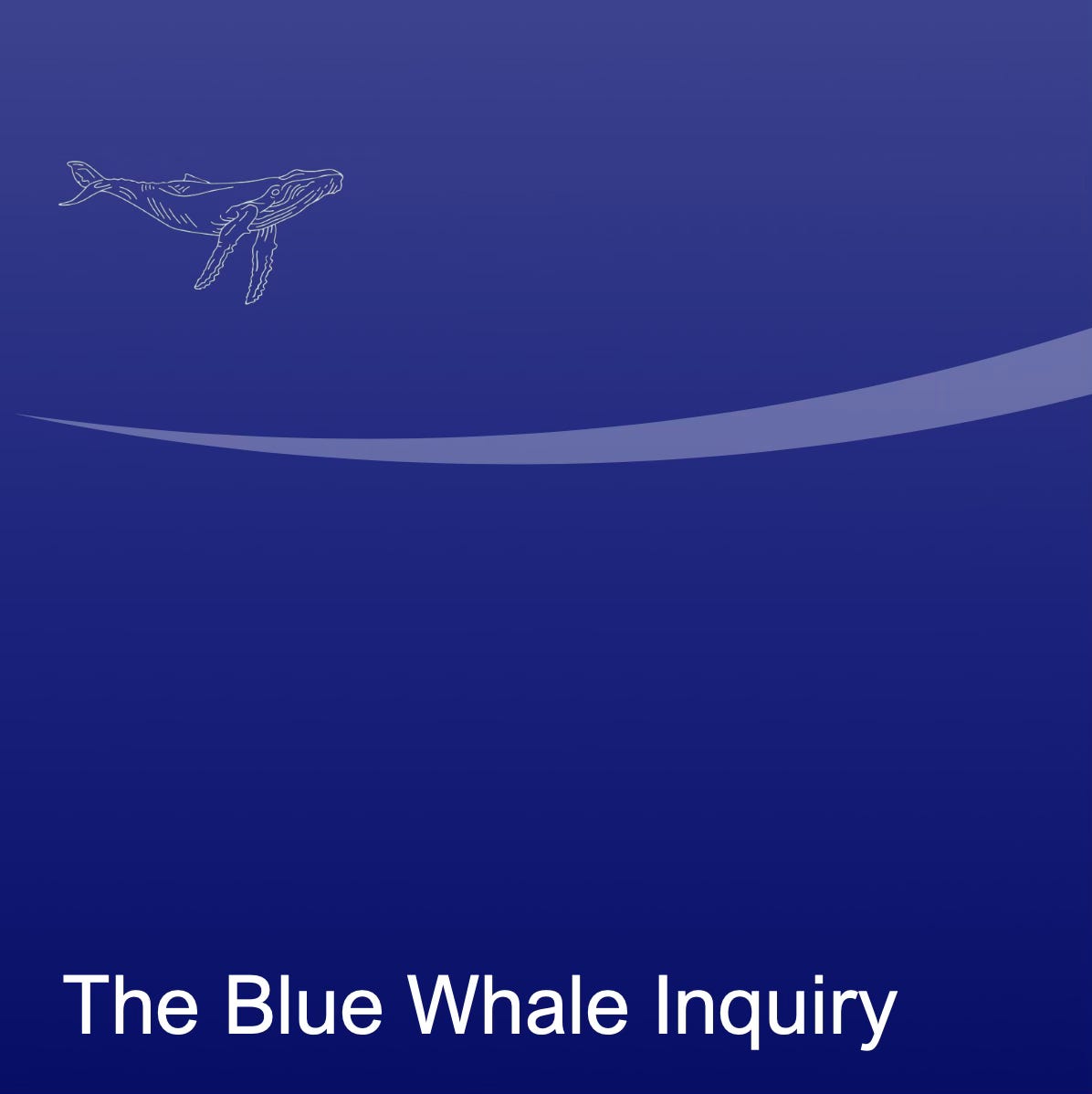How To Fillet A Blue Whale
SYSTEMIQ’s ongoing Blue Whale Inquiry concludes that the first rule of system change is, “don’t talk about system change.”
I was asked earlier today, in a podcast interview, “When you want to feel motivated, what one song is your feelgood anthem?” My answer, I don’t think I have ever had a feelgood anthem. But listening at a recent Founders Forum event to Marie-Kell de Cannart playing her violin along with the songs of humpback whales reminded me of when, back in the last century, I would sit in the dark with our daughters and listen to Roger Payne’s recordings of the songs of whales, including humpbacks and blues.
Some years after they were made, some of Payne’s recordings would be included on the Voyager Golden Record launched aboard the Voyager program spacecraft, the first human artifact to leave our solar system. And, whether or not I would have described Payne’s recordings as “out of this world” way back then, no human music has ever moved me so much.
And there were distant echoes of that this afternoon as I read Shock Therapy, a new essay developed as part of the Blue Whale Inquiry by SYSTEMIQ co-founder Jeremy Oppenheim. I can’t yet see it on their website, but its sub-title outlines its critically important theme, “A Strategic Reset for the Sustainability Movement.”
The Great Reset
As Jeremy explained in his cover note today, we are what “feels like another inflection point—not just for us, but for the broader project of sustainability. What we need now is not just more ambition or more urgency. We need a reset: of narrative, of strategy, of the role that sustainability plays in driving shared prosperity, resilience and innovation in a world that is changing fast.”
I don’t remember being taught at school how to fillet a whale, nor would I want to, but I do recall enjoying absorbing the delicate art of précising. So here, pretty much in headlines, are some of the key messages (and the emphasis is mine) I took away from the 14 pages of Shock Therapy.
On the first page, the seven key findings are summarized, underscoring our need for:
1. A new frame for the sustainability agenda, based on the promise of a better life, and an abundant, thriving and safe home for all.
2. A practical contribution to near-term political priorities, especially healthy economic growth, cost of living, and security; pulling climate (in particular) out of the culture wars.
3. Demonstrated tangible improvements in the lived experience of ordinary families in their local communities, ranging from clean air to resilience to jobs.
4. A strong embrace of digital/AI technologies as a critical accelerator of the transition, provided it is combined with greater access to those technologies, especially for developing nations.
5. An unflinching recognition that the pace of the transition depends primarily on how fast the new (energy/food/materials) system can outcompete the old system.
6. A doubling down on the architecture for putting climate and nature (including physical risk) onto the spreadsheet for public and private investors, especially those (institutional owners, [sovereign wealth funds], family-owned businesses, private equity) that can take a longer-term view.
7. The embrace of multi-polarity in the international system, with increasing norm-shaping power in the hands of players from the so-called Global South.
Better lives
Still, as Jeremy notes, each of these priority area presents very real dilemmas:
We want to rally citizens around the promise of an abundant and prosperous future, but we need to be straight about trade-offs, and where the benefits will take time. We want to be on the side of good growth, but without enabling the inequality and overconsumption baked into current economic models. We want to embrace the immense potential in technology, without succumbing to naive techno-optimism. We want to relentlessly push our governments towards ambitious international action, while recognising that most implementation does not happen at this level.
A striking conclusion is that “the sustainability movement has often done a remarkable job on substance—but has struggled to win on story. Net zero, gigatonnes of emissions, parts per million—these may be scientifically precise, but they do not move hearts or change votes. Nor do breathless warnings of ecological catastrophe or appeals to global public goods. These feel distant, abstract, and disconnected from people’s lived experience.”
The essay goes on to advise:
Even the language of “system change,” though intellectually vital—can feel alienating. Perhaps the first rule of system change is: don’t talk about system change. At its best, sustainability is a promise of freedom: freedom from polluted air, from unaffordable energy, from food systems that harm our health and ecosystems, and from plastics and chemicals that trash our environment, while entering and damaging our bodies. It’s the promise of green space, warm homes, safe streets, and resilient local economies. It’s not about restrictions or fear—it’s about the possibility of a better life.
Fusing climate and nature
So how to compete with the populists? Here’s what Shock Therapy has to say:
If there’s one thing to learn from successful populists, it’s this: speak to people in words they relate to, and about the things they care about. The most powerful movements are rarely built by command-and-control messaging. But we can still gather around a shared frame—one that speaks to human hopes, not just planetary risk, and does so in terms which can forge some common ground in today’s polarised social media landscape. In doing so, we must never cede the language of freedom and prosperity to those who claim that sustainability means coercion and control.
Fine, but given that we now need a better framing for our agenda and messaging, what should that be? Three main ideas have been proposed, we are told:
Abundance shifts the narrative from scarcity and sacrifice to generosity and opportunity. Resilience speaks to our desire for safety, especially in a more volatile world. Perhaps the most powerful, and unifying, is the idea of home. Home is both personal and shared. It bridges past, present and future. It implies safety, belonging, identity, and possibility. It touches security (physical and financial), opportunity (local jobs, decent services), and pride (in community, landscape, and legacy). Everyone deserves one—and one free from pollution and discarded waste. And the Earth is the only one we all share.
Crucially, the idea of home can hold both resilience and abundance within it—the protective and the aspirational—without requiring anyone to choose between the two. This frame is not just another metaphor. It’s the story that can hold the rest of our agenda together—linking freedom, wellbeing and progress in ways that are deeply felt across cultures and contexts.
Still, the strand in the essay that resonated most energetically with my own evolving thinking, some of which I am trying to capture here in my Rewilding Markets channel, and in my latest book project (on which more shortly), is around the growing need for a closer fusion between the climate and nature agendas.
“Today,” Shock Therapy observes, “these operate in parallel. Climate is often abstract and global, focused on carbon and energy systems. Nature is rooted in place, life, and connection—tied to forests, water, food, health, and culture. Climate speaks to the head; nature stirs the heart. Climate can be politically polarising; nature, when well-framed, is often bipartisan. Yet they are deeply intertwined—nowhere more so than in the food system, where emissions, ecosystems, livelihoods and public health all collide.”
And this is where it all begins to come together:
Bringing climate and nature together doesn’t just make strategic sense. It makes the story easier to tell. People don’t dream in carbon budgets. They dream of flourishing neighbourhoods, of cities lined by trees not traffic, of affordable food grown in healthy soils, of good jobs that give something back, of clean air and water, of places that feel safe and vibrant and alive. These are the building blocks of a good life—and they are all part of the sustainability agenda when it is seen whole.
Channelling Buckminster Fuller, who I had the great good fortune to meet in Reykjavik back in the late 1970s, Shock Therapy concludes that the way to shrink the legacy, problematic system is “to super-charge the new one. When the alternative becomes cheaper, faster, more appealing and versatile—as is now the case with clean electrification—change happens rapidly. And when investors can anticipate that tipping point and expect decent risk-adjusted returns, they pile in ahead of time and make the transformation self-fulfilling.”
If not that, then what?
There is a lot more to digest in this relatively short essay, but it is exactly the sort of thinking we need now. History suggests that the Trump regime will implode at some point—and even his base will start to ask, “If not that, then what?”
The risk is that, in their disappointment and anger, they will opt to do even greater violence to current political and economic systems, without any clue as to how we can transition to a system that increasingly works for all people and, ultimately, all life.
Meanwhile, we must talk about—and work on—system change ever more energetically and effectively. But, at the same time, our agendas need to be made relevant to ordinary people or, like ESG and DE&I, they will be blown out of the water.
Speaking of which, a theme touched on by Shock Therapy is the need to better engage with the world of the armed forces and defence. And that is something I began to do several years ago with a session on climate change alongside admirals, generals and air marshals. Strikingly, they proved a lot more knowledgeable—and concerned about—the climate and biodiversity emergencies, and about the risks that will flow from forced migration and other forms of social and economic instability.
Few of us, I suspect, will be spending much of 2025, or of the next electoral cycle, listening to the songs of distant whales. But those who hope to promote the right sort of system change need to read this essay—and soon.






Very interesting take on how the Sustainability movement should adapt to the current moment. The changes required to implement this approach might take years to enact and set in, but I think they have the potential to do a lot of good if done quickly and carefully.
And the inclusion of the opinions of members of the military and the defense industry was clever too, showing how universal this issue is and how broad the support is in society - at least if a broad enough message from the movement can capture that support.
Good read!
Thank you, John, for a perfect summary and reflection on Jeremy's work in developing lessons learned from his 9 years from the creation of SystemIQ. There is no question that Shock Therapy is the right strategy for the global sustainability movement. Ideas of framing the promise on freedom, abundance and home (quality of life, wellbeing) are key elements of the new action and communication agenda that is emerging. I spoke to Jeremy a few days ago and am writing a case study on Systemiq precisely to facilitate the emergence of this new thinking and doing. The work we are doing at the Leonardo Centre on Business for Society at Imperial is centred on exactly the same agenda, as you know. And we have unique evidence that shows how investors returns generated from only the most advanced corporate sustainability actions (innovations and transformational change initiatives) generate not just "reasonable" returns, but radically superior, risk-adjusted, returns compared to market rates. My main concern is: how do we coordinate effectively the action of a hugely fragmented movement of thought leaders, scientists, businesses, institutions, NGOs? How do we federate all on the same overarching agenda and, crucially, language?